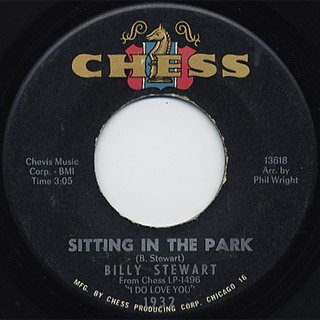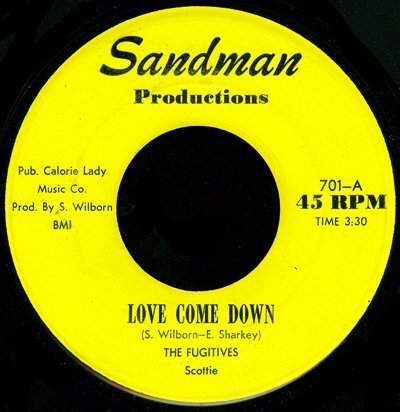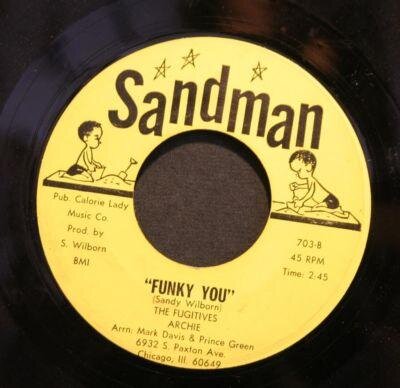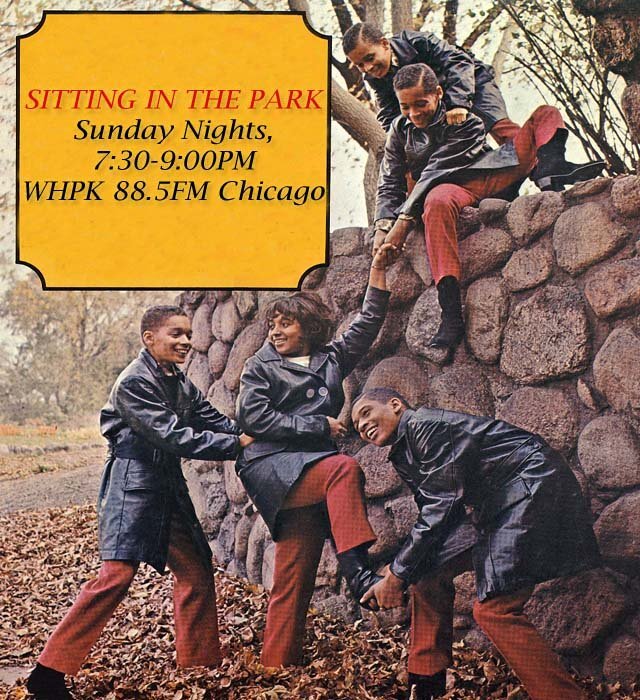Over the years whilst looking over Soul Source you may have noticed long time member boba regularly posting up the latest details of his weekly radio shows titled "Sitting In The Park". As the list of interviews with soul artists seems to be ever increasing we thought it may be a interesting thing if we ask Bob A for some background on both himself and the shows. Chalky got pm-ing Bob and they put together the below...
The story of Bob Abrahamian and his radio show Sitting In The Park.
"Sitting in the Park" is a weekly soul show that broadcasts every Sunday night from 7:30-9:00PM on WHPK 88.5FM Chicago. On the show, you'll hear Chicago soul and group soul, mainly from the 60s through the early 70s. You'll also hear interviews with soul groups. The webpage contains archives of every interview, so you can listen to members of these groups tell their stories in their own words. See the links at the end to view/listen the list of all interviews
Music shows
My parents never had a turntable or really owned any music. However, growing up, I got a boombox at a young age and really loved music, dubbing tapes, etc. Living in the suburbs in the pre-internet days, I didn't really have the ability to learn much about different genres of music, but I absorbed anything I could get a hold of.
I started college at the University of Chicago in 1995. I joined the radio station (WHPK) and was surrounded by people who had a huge depth of knowledge in all sorts of music -- it was intimidating. I specifically listened to the rap show every Friday night, as it was incredible not only to hear underground rap but to actually hear people coming up to the studio and freestyling live. It made the music seem very alive, real, and part of the community. Also at that time was a show called "The Dusties Party" which was started by and hosted by DJ Rick Wojcik. The show was focused on funk / soul / jazz, played from LP cuts, often records that were sampled in rap songs.
I bought my first turntable in '95 or '96. I remember the first two albums I bought - a best of Sly Stone LP and EPMD's comeback album. Around that time, in soul music (at least in the US), there was a culture of collecting "breaks" (records that were sampled in rap songs) as well as collecting funk 45s (which were being bootlegged onto different compilations). The majority of people of my generation who got into soul music did so through hip hop and digging deeper for the original samples. Around that time, Rick Wojcik from the Dusties Party and JP Chill, the main rap DJ at the station started a company called Dusty Groove. It was originally an online-only music mail order company that they ran from the south side before they opened up a brick-and-mortar store up north. The store itself was the embodiment of this new jazz / funk / soul / rare groove / sample oriented culture.
Around that time, Rick Wojcik stopped doing the Dusties Party and the show continued with a rotation of student DJs. A friend and I got onto the rotation. It would probably be extremely embarrassing now for me to hear one of those shows as I knew so little and probably did a terrible show. Doing a radio show, however, led me to dig deeper for records to play, as I hated playing the same things over and over again. At that time, the neighborhood around the university was a great place to look for soul and funk LPs, as there were a few record stores that people from the south side would come to to sell records. Some of these stores had a "cheap bin" where they would put lesser condition but sometimes very rare LPs. It was a great way to accumulate a lot of material for not much money.
As part of my looking for records, I started to go to thrift stores on the south side, looking for 45s (mainly hoping to find rare funk). However, Chicago was not a funk-oriented city and I ended up finding local Chicago vocal group records. The records blew my mind as the Chicago sound was a totally unique thing that I had never heard before. The records were also made more "real" by the fact that they were on tiny labels with local addresses. Just finding a rare local record, without even hearing it, was exciting, as it made me feel like I had some real connection to the music and even the people who had previously owned the record (similar to how the rap show seemed more "real"). I remember three specific records that had a very Chicago sound that really got me into the music and the Chicago sound - the Notations "I'm still here", the Ledgends "Something to remember you by" / "Gotta let you go", and the Chymes "My baby's gone away".
As I continued to do the Dusties Party, my shows fit into the format less and less, as I was playing 45s rather than LP cuts by artists such as Roy Ayers, Isaac Hayes, Kool and the Gang, etc. In 2002, I got my own show; I called it "Sitting in the Park" (obviously named after the Billy Stewart song) and played mainly sweet soul ballads off of 45s. Doing the show made me collect 45s much more aggressively; I listened to a recording of my show all week, it was like a mixtape, so I got tired of the music and didn't want to play the same song again. I went to record stores, record shows, thrift stores, bid on people's private lists and discoveries ads, etc. I would buy anything that looked interesting - I didn't really have any connection to other collectors who would put me on to specific "in demand" cuts. Also, I would only spend 25-50 cents per record until I couldn't find anything for those prices and went up to $1, then $5, then $10, etc. I still don't understand new collectors who want to spend hundreds on ultra-rare records rather than buying quality records by the Manhattans, Impressions, etc. for cheap.
When I started my show, I always dreamed of meeting some of the artists who made the music. My first interview happened by accident in 2004. I was at a record show and one of the people I always talked to said he knew Melvin Mason of the Mighty Marvelows and could bring him to the station for an interview. I agreed to do it. The next few interviews I did were also done through people I knew hooking me up with artists or just running into artists by being in the right place at the right time. I must have been very nervous; it's embarrassing for me to listen to earlier interviews now. The people I was talking to felt like celebrities, were much older than me, so it was difficult to interact with them.
I continued to do interviews on my show, almost all through word of mouth as one group that I interviewed would connect me to another group, etc. That approach also helped as I hate to cold call people I don't know; by using people's connections, one group could call the other one and explain everything up front and people would be warmer to me. I eventually put up a web page so people anywhere could hear these stories. There was also a lot of misinformation on the internet and I was hoping to clear it up via the actual people who made the music talking about their stories.
For everyone I interview, I make them a CD of all their material, actually give them a copy of their record (if it's less than $100 - almost nobody ever has a copy of their record btw), and mail them a CD of the interview afterwards. I also do a pre-interview with them on the phone, going over their story, as many people don't remember things from 40+ years ago until they've talked through it once; also, people don't remember things chronologically so talking it through once and getting all the information helps me keep everything in the order that it happened in the actual interview. Now I've done enough interviews that I'm no longer nervous or intimidated, which probably makes for a much better sounding interview. I also now have a large backlog of people to interview as I've found a large percentage of Chicago soul groups. I feel bad that I don't do more interviews now as many people are dying - some people have passed away since my interview and I've found people who have died a week before I called and talked to their widow. It's really important to get these stories out; most of the artists (many of whom were ripped off back in the day) are excited to be recognized and to have their material recognized as actual history (versus just something they did as kids).
Finally, with respect to my music shows, I am always looking for more records to play (since I still don't like to play the same records twice), and I spend a ridiculous amount of money on random records. A large percentage of the records I buy I have actually never heard. However, they almost always are interesting to me for some reason (e.g. the label, producer, etc.), and every day I open up record packages and listen to both sides of the records, putting some in the "to play" pile and putting others in the "to put away" pile. The most exciting thing for me is to discover a great, unknown record. Once a record is "known" and expensive, it is much less interesting to me and I will only try to get the record if I can get a really good deal on it. I don't understand the mentality of people who only want to buy expensive known records - it seems sort of like an ego thing to own or be able to show off as a DJ rather than enjoying all kinds of music. Also, I find my history of first listening to LPs and common records important, as I think the general context of the music and popular culture is extremely important in buying and understanding obscure records. After about 15 years of aggressively collecting soul music, I still am learning about new records every day. I also put in a lot of time into planning my music shows; I will pull out stacks of records from the "to play" piles and try to put together coherent sets of records with a similar sound. Some records sit in the pile for years until one day I get records that work together with them as a set. I find that meaningful sets are extremely important - I've heard shows from other DJs where they play a good, expensive record, then a couple of seconds of silence, then a totally different sounding expensive record. It just sounds horrible to me and makes good music sound bad. Overall, it's great to have something that I'm very passionate about although often it seems overwhelming spending so much time and money on it.
Recent Shows
The latest interview is with Michael Sharkey of the Fugitives and the Fabulous Fugitives out of Chicago.
Michael Sharkey (Fugitives, Fabulous Fugitives)
Click the following link to listen to music shows that I've done over the past few years
This is the last show for 2011 as the next two weeks' slots are going to different DJs playing holiday music. Thanks everyone for your support this year. You can listen or download the show directly from:
http://www.sittingin...12-18-2011.mp3?
You can listen to other music shows and interviews just by going to my webpage
Latest Playlist
Playlist for tonight's show follows. Thanks again for your interest.
Little Willie Parker - Looking in from the outside - Mar-Vel
Linda and the Pretenders - Believe me - Assault
Pat Lundy and Bobby Harris - We got a thing going on - Heidi
Opels - Please don't cry - Trex
Rance Allen Group - Gonna make it alright - Gospel Truth
Patterson Twins - You give me someone to love - Commercial
Flyin' High - Summer days and summer nights - Non-stop
Gino Washington - What can a man do - Atac
Marc Copage and the Merging Traffic - Our very first romance - Marco
Krystal Generation - Wanted dead or alive - Mister Chand
Sound Stage #1 - Reachin' out - Sta-ber
Odia Coates - Showdown - UA
Three Ounces of Love - Tumbleweed - Ecology
Jan Jones - Independent woman - Day-wood
Creative Source - You can't hide love - Sussex
Jim Gilstrap - Move me - Roxbury
Mary Wells - Don't keep me hanging on - Reprise
Odyssey - Don't tell me tell her - RCA
Ike Noble - It's bad - Alley
"C" on the Funk - A place - no label
Vortex - I can't help but love you - Search
Jeffrey Chambers and Gentle Persuasion - You never say I love you - Single B
Related Soul Source Articles
-
 2
2







Recommended Comments
Get involved with Soul Source
Add your comments now
Join Soul Source
A free & easy soul music affair!
Join Soul Source now!Log in to Soul Source
Jump right back in!
Log in now!